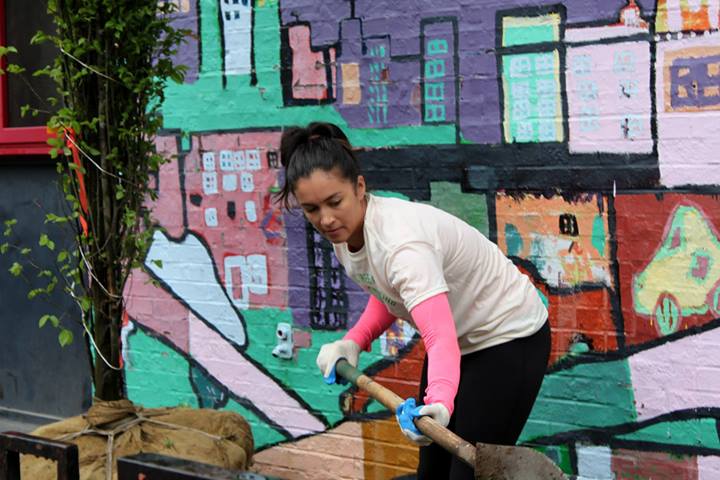
New York Restoration Project strengthens community by improving open spaces
Photo credit: Ellen Xie/New York Restoration Project.
A team from Charlotte, N.C., a Knight community, will shadow the work of the New York Restoration Project to improve quality of life in the city by transforming open spaces through the Resilience in the Public Realm initiative.

Related Link
“Charlotte, N.C., team to import ideas from work of New York Restoration Project” by Susan Patterson on Knight Blog
What if every walk from home to school, school to work, work to the grocer, promoted physical fitness, prevented crime, cleaned the air and water, offered opportunities for urban agriculture, provided habitat for birds and pollinators, and generally fostered constructive social behavior?
With help from Knight Foundation, New York Restoration Project will answer those questions with our project Resilience in the Public Realm. This multi-year initiative seeks to foster social and environmental resilience by bringing all open spaces in one low-income New York community to their full potential. Without support from Knight Foundation, we could not undertake critical planning, including spatial analysis to identify a community; the formation of an evaluation framework; and preliminary design concepts.
Green infrastructure, public health, affordable housing, social services all coincide in the public realm. As the vital connector between these overlapping urban concerns, public open spaces can support and amplify efforts intended to improve environmental quality, health, housing and other fundamental urban issues. With Resilience in the Public Realm, we will bring every open space in a single neighborhood – each street tree, vacant lot, park, community garden, median and the like – into a network designed to improve quality of life indicators such as public and environmental health, crime reduction and community engagement.
Strong correlations exist between well-maintained, verdant public open spaces and a range of quality of life metrics. Data and qualitative evaluations show that people who enjoy high-quality public space in their own neighborhood – by gardening, gathering to socialize or having a patch of grass to play on – tend to take better care of themselves and each other. We have witnessed this phenomenon on a very local level through our work in parks, community gardens, and other public and private properties for nearly two decades.
By transforming open spaces, we create a context for community to happen. At our Seagirt Boulevard Community Garden in the Far Rockaways, community gardener Sharon Keller grows fruit and vegetables. Because Sharon suffers from lupus, organic, nutrient-rich produce is essential, but hard to come by affordably in the Far Rockaways. Sharon also advocates for the community, spreading the word about garden-based resources neighbors can tap into by simply getting involved. She introduced the space to Rich Maddox, for example, who started growing produce at Seagirt as well.
When we conducted post-Hurricane Sandy restoration at Seagirt, Rich volunteered with New York Restoration Project, rekindling dormant carpentry skills as he built vegetable beds alongside our staff. Last autumn Rich joined our operations team as an AmeriCorps member, bringing those carpentry skills to all our Brooklyn and Queens gardens. He’s developing horticultural skills and deepening social connections within his neighborhood. The impact of our green spaces on local communities is cyclical; as Rich’s skills and connection to his community improve, so too do the quality of spaces he works on, providing the opportunity for others to follow the same path.
After nearly two decades bringing private resources to spaces that lack adequate municipal support, we are eager to demonstrate what we already know is true: the presence of high-quality, well-maintained public open spaces decreases crime, increases small business success, and improves mental and physical health. Resilience in the Public Realm will prove those links, by beginning with a comprehensive data baseline against which we’ll measure future conditions. This research and data baseline will be established with support from the Doris Duke Charitable Foundation.
We’re confident that this carefully planned approach, working at the neighborhood scale and engaging community at every point, will produce meaningful and measureable change, one neighborhood at a time.
Deborah Marton is executive director of the New York Restoration Project.
Recent Content
-
Communitiesarticle ·
-
Communitiesarticle ·
-
Communitiesarticle ·


